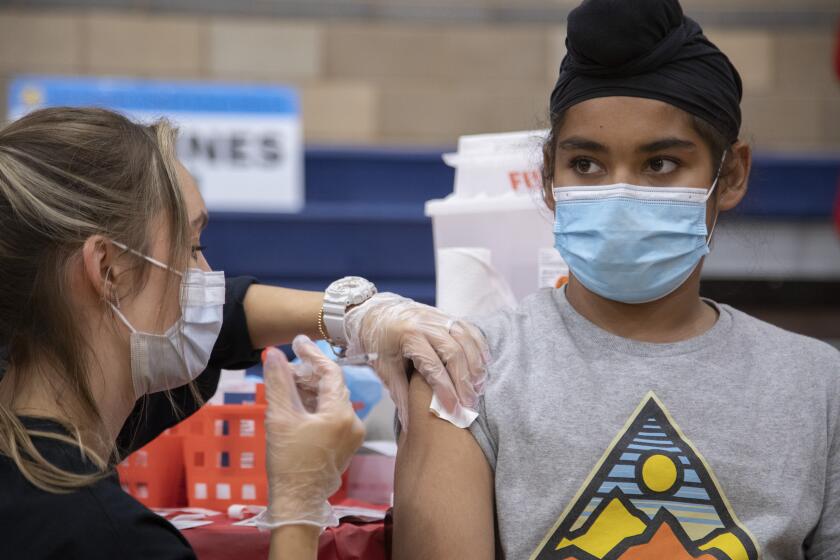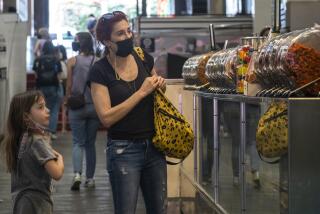L.A. hasn’t cited any businesses for violating proof-of-vaccination rules

- Share via
It was a decision that grabbed attention across the country: Los Angeles leaders had voted to require indoor restaurants, gyms, movie theaters and many other businesses to check that customers were vaccinated against COVID-19.
The L.A. rules made headlines as some of the strictest in the nation. Opponents — including members of the Libertarian Party of Los Angeles County — phoned into the City Council meeting in October to decry the decision and vowed to overturn the ordinance at the ballot box. City leaders were unmoved.
“This is no longer negotiable,” City Council President Nury Martinez told reporters in the fall. “The stakes are too high.”
Yet more than three months after the council cast its vote, L.A. had not cited any businesses for violating those rules, despite getting hundreds of complaints about sites flouting the requirements.
The Department of Building and Safety, which was put in charge of citations, said it is instead focusing on outreach and education until the end of January. As of mid-January, it had gotten more than 200 complaints about businesses violating the rules, triggering visits to 187 sites.
With Super Bowl events just a few weeks away, COVID-19 continues to wreak havoc with the LAPD as well as the L.A. County Sheriff’s Department.
City records show that while L.A. has gotten complaints about violations at a range of businesses, more than half of the complaints involved restaurants, including fast food joints, pizzerias and other establishments, a Times analysis of their addresses found. Other businesses that drew complaints included gyms, beauty salons and bars.
In some cases, it could not be discerned which business was the target of a complaint because city data included only addresses for a shopping mall or plaza — including the Westfield Century City mall and the Sherman Oaks Galleria — rather than identifying a specific business. Malls themselves were originally included in the ordinance but were later exempted.
The Los Angeles ordinance went into effect early in November, but the law stated that enforcement — starting with warnings — would not begin until at least Nov. 29. The law was soon amended to authorize the building department to handle citations, and that amendment went into effect on Dec. 17.
But the city opted to hold off on penalties for businesses. In a report to City Council members that laid out how the rules would be implemented, Chief Legislative Analyst Sharon Tso said the building department would “emphasize outreach and education activities” during December and January, in order to “properly educate businesses of the new requirements” and train enforcement staff.
The delay frustrated some Angelenos, especially as coronavirus cases surged to record heights in L.A. County this winter with the rise of the highly contagious Omicron variant.
Hollywood resident Andrew Rudick, who works in casting in the entertainment industry, was thrilled when L.A. passed the new ordinance. Knowing that the diners around him at restaurants were vaccinated would make him more comfortable going out with his fiancee and friends, he said. When he stopped into some local businesses, however, he was dismayed that they weren’t checking for proof of vaccination.
Rudick phoned and emailed city and county agencies to try to find out who was enforcing the rules. When he ultimately found out that the building department would not be issuing any citations before February, he didn’t bother to lodge a complaint.
“What’s the point?” he said.
More broadly, Rudick argued, “if there’s no accountability for public health risks, then what’s the point of implementing these orders at all?”
Brentwood resident Rachel Reyes, a community organizer who works at a boutique, said the long hold-off on citations “communicates that the city isn’t serious about stopping the spread or protecting workers.”
“I get that businesses needed an education period,” but “it’s a bit of a joke,” Reyes said. “It’s already the new year and you’re going to wait until February, after these massive surges?”
Martinez, the City Council president, said in a statement that “the intention of this was never to penalize businesses, it was to create safer public spaces for Angelenos during this pandemic.”
“Regardless of a citation enforcement date, we need businesses to step up and protect their patrons, especially during this current surge,” Martinez said. “Businesses need to do their part so we don’t go backward .... While there is a grace period for citations through Feb. 1, establishments are still required to check vaccination cards.”
Councilman Gil Cedillo, who voted in favor of the ordinance, said that “education and outreach are important for the customers and much more for businesses, especially if the enforcement is imposed on businesses and not the customers.”
A bill that would require California school kids to be vaccinated raises debate over parent rights and the role of the government, among other matters.
“For this very reason, it is essential that businesses fully appreciate and understand what they are being cited for to have any success with an ordinance that requires compliance,” Cedillo said in a statement. Enforcing the law more aggressively would have little or no effect on the latest spike in cases, he added.
Business groups argued that the education period was sensible. Stuart Waldman, president of the Valley Industry & Commerce Assn., said that even without citations, “most businesses jumped right in and started enforcing the rules that were passed.” Maria S. Salinas, chief executive and president of the Los Angeles Chamber of Commerce, said in a written statement that “educating businesses on health guidelines is a wise investment.”
“With various health guidelines from multiple entities, we have stood by the business community, especially our small businesses, to ensure they have clarity and are educated about health guidelines,” Salinas said.
In public health, “we don’t try to force people to do things — we try to encourage people and educate people to do what we believe is best for their health,” said Dr. Timothy Brewer, a UCLA professor of medicine and epidemiology. “We’re used to relying on education and persuasion rather than enforcement.”
But “if everyone was aware there was no enforcement” of the city rules, Brewer said, “it’s certainly possible that compliance would drop.”
More to Read
Sign up for Essential California
The most important California stories and recommendations in your inbox every morning.
You may occasionally receive promotional content from the Los Angeles Times.














